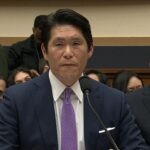
Published January 28, 2023
With only a thin and fractious majority in the House, the GOP is facing two years of struggling to set any kind of positive agenda. But one thing every elected Republican would agree on is the need to scrutinize the Biden administration.
Rep. James Comer of Kentucky, the new chairman of the House Oversight Committee, has already been hard at work, firing off letters demanding answers to pointed questions on border photo ops, President Joe Biden’s handling of classified documents, presidential visitor logs, remote work among top federal employees and Hunter Biden.
This is, of course, business as usual. The party that doesn’t control the White House will always seek to score political points on possible bureaucratic scandals. In return, Democrats’ instinctive reaction might be to circle up the wagons and seek to stonewall or downplay as many of these efforts as possible.
But one area of focus for the Oversight Committee deserves to be taken seriously, not just as a political point-scoring operation, but as an earnest attempt to improve how government works. A genuine bipartisan commitment can and should be made to evaluate the extent of fraud in the pandemic-era safety net measures. A better understanding of where the system failed would not only shine a light on how some funds were misspent but also lay the groundwork for better administration of safety-net benefits, in ways applicable and valuable even outside of the unique circumstances of a global pandemic.
Recall that as the initial wave of coronavirus cases hit US shores, economists feared we could be headed for an economic meltdown. People stopped going about their daily lives, stay-at-home orders went into effect and businesses responded by laying off workers left and right. The unemployment rate spiked to 14.7% in April 2020, the highest level in the post-World War II era.
Congress wanted to provide aid as quickly as possible; there simply wasn’t time to sit around and construct the ideal policies. As part of the frenetic response, the federal government used the often-clunky unemployment insurance systems run by states to try to backstop households’ finances.
Fraud became an issue due to a number of factors, according to a June 2022 report from the Government Accountability Office, including unclear federal guidance, ill-equipped state offices and a relaxation of normal eligibility rules. It didn’t help that 32 states run their unemployment insurance systems on outdated infrastructure, often developed in the 1970s and 1980s, according to that same report. These systems make it difficult for states to have the flexibility and responsiveness necessary to run benefit programs efficiently – even when there isn’t a global pandemic.
The underlying structure of unemployment insurance may have been an issue as well – the federal government provides support and technical assistance, while states determine eligibility and ensure accurate payments. The jerry-rigged systems in many states couldn’t handle the surge of applicants and a newly created unemployment insurance program relied on self-certification. Without any requirements to prove lost income, the program opened the door to bad actors.
But some of the headlines about the amount of fraud in pandemic assistance are likely overblown. One widely-repeated claim about the ubiquity of fraud was advanced not by a disinterested party but by a company that sells ID verification systems. The GAO report estimates the amount of unemployment insurance fraud is likely over $60 billion (or about 7% of total $878 billion spent), although the true amount may not be knowable.
$60 billion sounds like a lot of money, but some could argue the result justified the leaky process. Research by the Brookings Institution found that the expanded unemployment benefits delivered the most aid to lower-income workers, stabilizing the broader economy by keeping consumption stable. At the peak of Covid’s impact, millions of workers every week were applying for unemployment insurance; if excessive concern about fraud had prevented rolling out the federal expansion of benefits, it could have taken a lot longer for the economy to recover.
But with the worst of the pandemic in the rear-view mirror, cracking down on people who abused the system and making it harder for future scammers to do the same is an appropriate area for the Oversight Committee to focus on. A full, bipartisan Congressional inquiry could spotlight the weaknesses of the current system and where it was taken advantage of in order to lay the groundwork for future efforts to improve the way benefits are disbursed.
Not doing so would allow distrust around government programs to fester. Some voters who hear stories about fraudsters taking advantage of pandemic-era assistance – especially blatant examples of people who listed their name as “N/A” or claimed that they owned nonexistent farms – may lose faith in government’s ability to function properly. Knowing that the expanded assistance helped the economy does nothing to change or address the fact that some people took advantage of loopholes in the system.
Some initial steps have been taken to address this lingering concern. The Pandemic Response Accountability Committee, which was created as part of the Coronavirus Aid, Relief and Economic Security (CARES) Act in 2020, has provided publicly available data on how emergency pandemic funds were spent. Last summer, Congress passed bipartisan bills extending the statute of limitations to prosecute individuals who committed fraud through the Paycheck Protection Program or the Economic Injury Disaster Loan Program. And Democrats, such as Rep. Jim Clyburn of South Carolina, who previously served as the chair of a subcommittee on the coronavirus response, have rightly pointed out that small business aid during the pandemic was also plagued by fraud and improper payments.
Yet more could be done. A GAO report in October 2021 made six recommendations about how the Department of Labor could stem fraud in unemployment insurance programs, but a recent follow-up found the department had not implemented any of them. The deluge of cases has left investigators overwhelmed, and Congress could beef up funding for the agents that investigate pandemic fraud.
Last year, the Biden administration announced initial steps to combat fraud and identity theft in pandemic relief, but it hasn’t made a priority of supporting bills like the one introduced in 2021 by Sen. Ron Wyden of Oregon, which would have modernized the unemployment insurance program. Helping states develop better systems of determining eligibility and automating basic safeguards could make it easier to keep scammers out and make sure the truly deserving get the benefits they need.
Republicans are right to put the spotlight on those who took advantage of pandemic-era programs. Democrats should join them. Getting benefits into the hands of people who merit them and keeping them out of the hands of people who don’t should be something both parties agree on. Amid all the other controversies that take up political oxygen, a concerted effort to crack down on wrongdoing and improve how our social safety net functions could be a welcome breath of bipartisan air.
Patrick T. Brown is a fellow at the Ethics and Public Policy Center, where his work with the Life and Family Initiative focuses on developing a robust pro-family economic agenda and supporting families as the cornerstone of a healthy and flourishing society.
Patrick T. Brown is a fellow at the Ethics and Public Policy Center, where his work with the Life and Family Initiative focuses on developing a robust pro-family economic agenda and supporting families as the cornerstone of a healthy and flourishing society.












